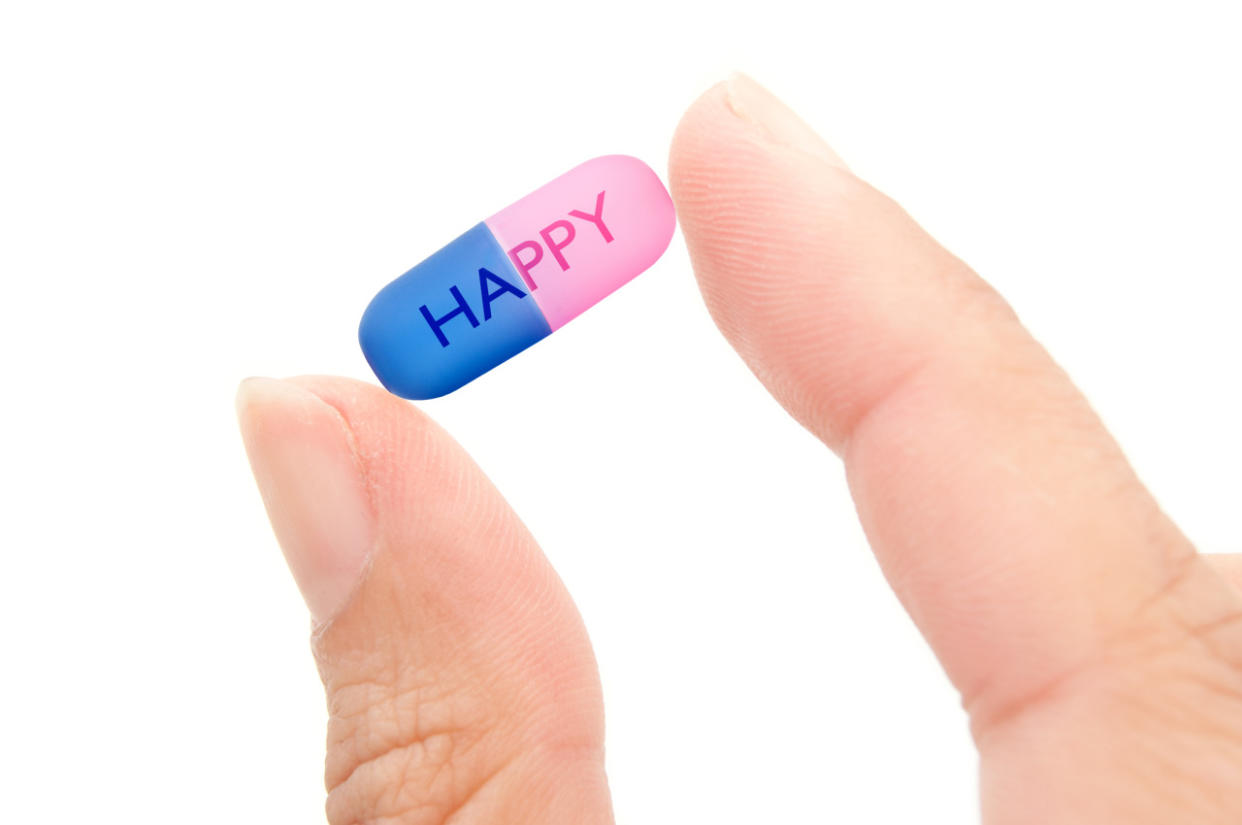On the pill: Why taking antidepressants is the latest mental health taboo

There is still a stigma surrounding the taking of antidepressants [Photo: Getty]
Earlier this week Amanda Seyfried opened up about why she doesn’t think she will ever come off the antidepressants she takes to keep her mental illness in check. The 30-year-old actress has been taking Lexapro to help manage her Obsessive Compulsive Disorder (OCD) since she was 19-years-old.
“I’ll never get off of it,” she told Allure. “I don’t see the point of getting off of it. Whether it’s placebo or not, I don’t want to risk it. And what are you fighting against? Just the stigma of using a tool?”
It’s that exact stigma that forces thousands of mental health sufferers to feel the need to hide the fact that they take antidepressants. Because while we have been making strides in putting mental health on the talked about agenda, there is still a shroud of secrecy surrounding the taking of medication.
“For some people, when they experience a problem with mental health, such as depression, it’s difficult to take the first step in seeking help, and it’s not uncommon for people to hide the fact that they’re receiving treatment,” explains a spokesperson from Rethink Mental Illness. “All too often that’s because of the stigma and misunderstanding which is still associated with mental illness, and fears around its affect on aspects of life such as work, family and friendships.”
But it seems incredible that the taking of pills to control mental illness is still considered a guilty secret, particularly when you consider how many people are actually being prescribed antidepressants.
According to recent statistics from the Health and Social Care Information Centre (HSCIC), the number of antidepressants given to patients in England has doubled in a decade, with a further survey revealing that at least one in 11 British adults now take antidepressants.

That’s a heck of a lot of people. So, with so many of us relying on anti-ds to control anxiety, depression and other mental health disorders, why does the stigma about taking medication persist?
“Unlike other illnesses that manifest themselves physically, mental health issues are often invisible, which sadly means that if some people don’t see a physical symptom, they won’t believe it’s there, thinking someone is just exaggerating their problems,” explains Niels Eék, psychologist and Co-Founder at personal development and mental wellbeing app Remente. “Because of this, many of those suffering from depression or anxiety disorders won’t openly discuss their conditions and will not disclose that they are taking medication, unless it is behind closed doors, amongst family and friends.”
Dr Eék says there are a number of myths surrounding the taking of mental health medication, which mean sufferers often choose to remain tight-lipped about their treatment.
“Some people believe that medication can’t be used to help a mental health problem and that people should just ‘pick themselves up’ or ‘deal with it and move on’,” he explains. “However, medications like antidepressants actually help correct chemical imbalances and work on the neurotransmitters to lessen the symptoms of the condition.”
Many people believe that taking an antidepressant is a sign of weakness or an inability to deal with problems. Others think that they can be addictive.
“It is falsely believed that antidepressants can change your personality, dulling your mood and preventing you from properly ‘feeling’,” continues Dr Eék. “However, what the medication actually does is bring you back to feeling normal and like yourself, without the anxieties and depressive episodes.”

Are antidepressants the last taboo in mental health? [Photo: freestocks.org via Pexels]
The myth of the ‘happy pill’
Another popular myth surrounding the taking of antidepressants is the fact that they are often thought of as some kind of miracle pill that merely serve to give takers a happy high.
“It is thought that antidepressants are a sort of ‘happy pill’ that will just boost your mood,” says Dr Eek. “Again this isn’t correct, as what they actually do is restore the chemical balances in your brain, not actually giving you a feeling of euphoria.”
The difference may sound subtle but it’s important, because misunderstanding the complexities of medication as a form of mental health treatment merely serves to encourage the silence surrounding it.
But people are trying to get the conversation started. Last year, Erin Jones, a mother of four from Nashville who has struggled with anxiety and depression for 14 years, posted a selfie proudly flaunting a prescription for an antidepressant on Facebook.
“Anxiety and antidepressant medication to the rescue,” she captioned her post. “Sometimes, folks, we just need help.”
Erin decided to share the selfie to prove to others that admitting you need help managing your illness is not the same as admitting defeat. Later, Erin created the hashtag #MedicatedAndMighty which encouraged other mental health sufferers to proudly share selfies with their own medication.
The message is clear, taking mental health medication doesn’t make you weak, nor does it deter from your ability to stay strong in the face of adversity. Because opting to take medication for a mental health problem can be one of the bravest decisions sufferers can make. At the very least it shows that they are willing to get help, that they want to get better and it reflects the fact that they think they can get better.
The hope is that by sharing their mental health battles so openly, judgment about medication will ultimately fade and as a result people suffering from anxiety and depression will feel more confident coming forward to seek the help they need to treat their conditions.
“Wearing glasses to improve your eyesight is not questioned, neither is taking medication to control high blood pressure – in the same way, it should be accepted and even praised that those suffering from a mental health illness are taking steps to make themselves better and improve their standard of living,” explains Dr Eek.

Let’s talk about antidepressants [Photo: Getty]
And for many people antidepressants and other medication can be a hugely effective way of treating a mental health disorder.
“Many people find medication very effective in managing depression, and it can be a vital ingredient in supporting someone towards recovery,” says a spokesperson from Rethink Mental Illness. “But it’s by no means the only option, and it’s important the people are made aware of, and are able to get access to, a full range of help, support, advice and talking therapies, so that they have a choice and say in their treatment, and can find what works best for them.”
As Amanda Seyfried explained mental health is just as much as illness as any other, and as such it should be treated with equal respect.
“A mental illness is a thing that people cast in a different category [from other illnesses], but I don’t think it is. It should be taken as seriously as anything else.”
And though you might not be able to see it, it is definitely there.
“Why do you need to prove it? If you can treat it, you treat it,” she said.
For more information on depression and treatment you can download the Rethink Mental Illness factsheet.
To support the Time to Change initiative visit their website.
Do you think taking medication for a mental health condition should be more openly discussed? Let us know @YahooStyleUK
Anxiety is a very real health issue - so why isn’t it taken seriously?


